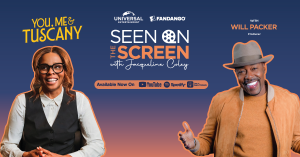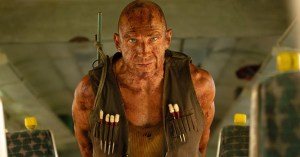Riz Ahmed’s Celebrated Turn In Sound of Metal Brought Him Closer to Stillness, Pain, and Big Questions
Preparing for the role that many say is his career-best work, the U.K. actor and musician learned American Sign Language, metal drumming, and, in the process, a whole lot about himself and his craft.

(Photo by © Amazon Prime Video)
From Four Lions and The Night Of to Nightcrawler and Rogue One: A Star Wars Story, British actor and musician Riz Ahmed has slowly been amassing the kind of enviable credits that mark any new project of his as a major event for in-the-know film fans. Last year saw the release of a film that centers on what many claim is Ahmed’s most complex and captivating performance yet.
In the Certified Fresh Sound of Metal, Ahmed plays Ruben, a metal drummer grappling with his rapidly deteriorating hearing while at a rural community that houses deaf recovering addicts. As Ruben struggles to be at peace with the silence that engulfs him and the film alike – with first-time director Darius Marder’s stunning sound design echoing Ruben’s own journey – he begins learning American Sign Language; but as his desire for things to go back to normal runs up against his newfound reality, he must decide how and if to move on.
With Sound of Metal catching awards-season heat and earning Ahmed critical accolades – including a Gotham Award win for Best Actor – and another Certified Fresh music-centric film, Mogul Mowgli, awaiting U.S. release, we sat down with Ahmed to talk about what he learned from the deaf community while prepping for the film, how his music career informs his acting, and the David Bowie line that’s currently guiding his work choices.
Manuel Betancourt for Rotten Tomatoes: In terms of the prep for Sound of Metal, I know you spent months practicing drums and learning sign language. What surprised you the most about mastering both of those skills simultaneously?
Riz Ahmed: I started down the road of learning how to play the drums and learning American Sign Language because that’s what the character has to do. Darius wanted the drumming to be for real; he wanted us to be able to improvise with deaf actors on set. But actually what I got out of learning those two skills was more than just the skills themselves. I think they really opened me up in interesting ways. So I think of what Guy Licata [the Brooklyn-based drummer with whom he practiced] told me when I was learning how to play the drums: you can’t play the drums, they have to play you. There’s an element of surrender and submission and giving over to your body and your instinct that has to occur in order to successfully try and, you know, drum anything. That was a lesson for me in the same way that it’s a lesson for Ruben in the movie about what you lose, sure, but also, what can be gained when you lose control. I kind of feel like there was a quite profound lesson in there.
Then, with the American Sign Language, I feel like the deaf community taught me the true meaning of the word “listening.” And the word “communication.” Listening isn’t something you just do with your ears. It’s something you do with your whole body. It’s about putting yourself in a state of receptive attention for someone else’s energy. I think that members of the deaf community and the deaf cast on this project, for me, are some of the best listeners I have ever met in my life. And you know, [co-star] Jeremy [Lee Stone] would say that there’s a trope in the deaf community that hearing people are emotionally repressed because they hide behind words. When I started becoming more fluent in ASL I understood what he meant, because when you communicate in sign language, you are doing it with your whole body in such a connected way that feels so visceral you find yourself getting much more emotional about things. At least I did signing them.

(Photo by © Amazon Prime Video)
There’s such a physicality to Ruben. He’s both so electric and so still at the same time. I wondered if this experience will affect not just future roles but also the way you approach your work.
Ahmed: Well, again, I think it’s more that the process of preparation worked on me. You know, it wasn’t a matter of me kind of controlling this. It just happened, I think, by trusting the process of learning to play the drums and sign language which are both nonverbal communication that force you to communicate more with your body and place you more in your body. So I think the demands of the role technically ended up having other effects. They just kind of inform the performance.
To be honest, I kind of feel like I went into this project looking for a new process and looking for a new way into my work. I think coming from a British background there can be a lot of onus on the text, and a lot of kind of cerebral analysis of texts and story and character. And that’s great. But I was looking for something that I could connect to more viscerally, and that I could experiment with a more physical and visceral process.
Part of the message of the film, as you point out, is about slowing down and being at peace with the silence, being okay with recalibrating one’s priorities. Do you find it resonates differently now, in that sense, than when you first read the script and shot it?
Ahmed: Yeah, I feel like it resonates differently for a few reasons. You know, one is that obviously when you’re in the thick of something you can’t see the edges of it. I knew that Darius had such a bold and such a specific vision; everything from wanting to shoot chronologically to the really unique sound design – which was put together in such an experimental and ambitious way, sampling sounds from my own internal body processes to create this very subjective effect – to the fact he wanted to shoot on film. I knew that he had a particular vision. But seeing it all come together is all the more mind-blowing. I’m just a little bit in awe of what Darius has pulled together with such little time and money.
And then I think why it resonates differently is because of the pandemic. I think the pandemic is a time where many of us have lost our routines and access to our work, through which many of us define ourselves, and have been forced to kind of sit with ourselves. Sit still and sit in silence. And that’s absolutely what Ruben is forced to go through. So I kind of feel like everyone’s going through their own version of Ruben’s purgatory that he goes through in the film.

(Photo by © Amazon Prime Video)
Speaking of our current predicament, I wanted to ask how it feels to be promoting a film like this one without, say, theater screenings where you’d get more of an immediate connection with audiences. How does that feel on your end?
Ahmed: Oh, it feels a bit heartbreaking, to be honest, because one of the joys, I think, of the Toronto premiere for this film was deaf and hearing audiences experiencing the film together, which is something you often can’t do. There’s open captions in every print of the film. That means that there is no screening of this where deaf audiences can’t also watch the film alongside hearing audiences. That was really, really powerful. It’s amazing how a piece of work can be a bridge in that way and create conversations between communities that might normally be quite segregated.
I watched Mogul Mowgli recently and it strikes me that it and Sound of Metal are sort of sibling films. Mowgli follows a British-Pakistani rapper about to get a big break only to find himself coping with a debilitating autoimmune disease that stops him in his tracks and forces him to wrestle with his heritage and his legacy. They’re so different, both in style and in theme, but they feel like they’re speaking to one another. Do they feel that way to you?
Ahmed: Yeah, it’s interesting. I mean, Mogul Mowgli is something that I was kind of shaping with Bassam [Tariq] for a couple of years before we made it, and Sound of Metal came along in that moment. So I guess my headspace was already in this kind of zone where I was thinking about like, Why do we do what we do? And what’s it for? What am I doing, basically? I think I was hitting a bit of a wall in my process where I kind of wanted to find a new way to work. I didn’t feel I was growing as much as I could be.
Alongside that, I was kind of wondering what the point of any of this is, you know, when the world seems to be falling apart all around us. I was interested in exploring this question, and I think, you know, for Ruben, it’s coming from a place of: “Why do I do what I do? Is it because it’s a distraction from having to sit with myself? Is it a distraction from having to deal with my demons? That my relationship with my creative obsession is a way of staying busy and looking everywhere but inside?” For Zed in Mogul Mowgli, it’s coming at that question saying, “Are we doing this for ego? Are we doing this for a sense of legacy? Are we doing this because we want to kind of come down from the mountain like Moses?” I guess, a question I was just grappling with is: What’s the point? Why are we doing what we’re doing, as artists or creatives?

(Photo by © Amazon Prime Video)
Do you find yourself armed with better answers to those questions after working on these projects?
Ahmed: Well, something I realized in the research for Sound of Metal, and being around these punk drummers and metal drummers with big scary tattoos and piercings and angry loud music, was understanding some of the traumas behind that music, some of the catharsis in that music. I think, for me, a big part of why I’m doing this and something that has led me to create a more personal place is to try and name your pain. Name the pain that made you so you can heal others, you know? There’s this great kind of interlude somber start of this recent J. Cole track, “The Climb Back,” that says: What are you doing this for? Are you doing this to get things, or to let them go? — I like to think maybe I’m trying to embrace the idea of letting go, and allowing that to inform the process.
Which can be very hard, and it feels counterintuitive to how we’ve normally understood ideas of success.
Ahmed: Yes. And it’s very tricky because the creative craft and the creative industry stand in opposition in terms of what they demand from you. A creative craft is about a state of flow where you negate your ego, transcend your ego, and are in a receptive state and a state of emptiness, really, so you can be an open vessel for what the canvas wants you to paint on it. Or what the beat wants you to rap onto it. And the creative industries are very much about enforcing and building up your ego and communicating a very kind of posterized self-image to the world, which isn’t a receptive state. It’s a state of pushing. It’s a state of armor. And so, there’s always this tension between the creative craft and creative careerism. They’re always kind of engaged in a bit of a dance.
Finally, I wanted to talk about the way music is so central to these projects. I feel like when you’re talking about finding an artistry that feels personal I keep thinking about an album like The Long Goodbye, which you released last year, or a song like “Once Kings,” which was tied to Mogul Mowgli’s release. Is music a way to unlock these other aspects of your work?
Ahmed: I think the way you do anything is the way you do everything. So I think there’s been an evolution in the way I approach music, as well as acting recently. I think, that with music I might have thought more about what I can contribute to the wider culture or what my community or my people might want from me or what my 18-year-old self wished existed and kind of trying to cater to that from a place that felt authentic and honest to me, but very much with one eye on the outside. David Bowie says that younger artists play to the gallery. I think now I’m thinking more about just what I need to get off my chest. I think there’s a real shift even from the Swet Shop Boys to The Long Goodbye, which is more personal, more emotional. And then from The Long Goodbye even to “Once Kings,” in terms of thinking more about how you can name your pains and share them with others in a way that might be healing.
Rather than try and represent others, just present yourself, which, I think, takes time.
Sound of Metal is available now on Amazon Prime.






